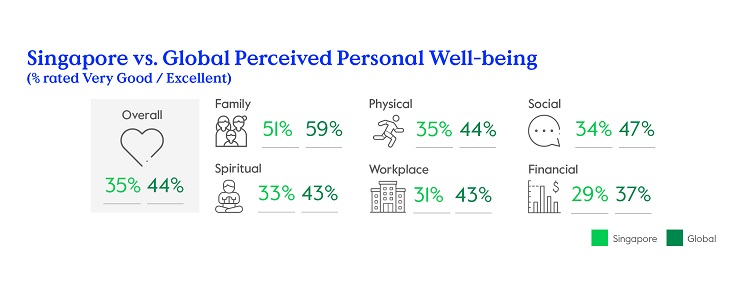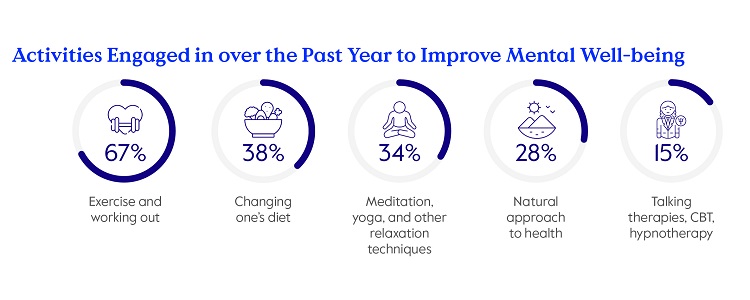- For SME and Groups
- For Individuals
Group Health Insurance
About Cigna Healthcare
Inflation making it too expensive for Singaporeans to stay healthy
Inflation making it too expensive for Singaporeans to stay healthy
New Cigna Healthcare Singapore report, titled Staying Well amidst the Cost-Of-Living Crisis, shows mounting concern over soaring day-to-day and healthcare costs, taking a toll on well-being.
The global cost-of-living crisis continues to hit Singaporeans hard with as many as 64% respondents in the nation saying that rising inflation is making it too expensive to stay healthy, according to a new report from Cigna Healthcare Singapore.
Our key findings:
- Almost half of Singapore respondents (47%) say that inflation and the economy is their top concern
- Close to two thirds (64%) say that inflation is making it too expensive to stay healthy
- Financial well-being rated as the lowest area of well-being, with only 27% of people describing their current financial situation as “good”
Our newest 360 Global Well-Being: Singapore Insights Report, titled Staying Well amidst the Cost-Of-Living Crisis, found that inflation and the economy is the top concern for close to half of Singapore respondents (47%), well above the global average of 37%. The next biggest concerns are unemployment (14%) and healthcare (12%).

Concerns around healthcare costs are growing in the near term
While the most urgent concerns amongst Singaporeans include the soaring cost of day-to-day items such as food and essentials, restaurant bills, energy, fuel and utilities, the study reveals that these concerns are stabilising with fewer respondents expecting a cost increase for such items in the next three months compared to those who have seen an increase in the last three months.
The findings paint a different picture for healthcare costs. Almost half of respondents (48%) are expecting a cost increase in the next three months while 40% saw an increase in the previous period. The majority of respondents consider their ability to meet their own or their family’s medical needs as only “fair” (55%) or even “poor” (17%), which signifies an overall lack of confidence amongst Singaporeans when it comes to managing the rise in medical costs.
Moreover, cost is not the only healthcare concern – a considerable proportion of Singaporeans are facing difficulties accessing quality care.

Singaporeans suffering from below average well-being
In the face of rampant inflation, only 27% of respondents in Singapore describe their current financial situation as “good”, with 73% saying it is “fair” or “poor”. Unsurprisingly, Singaporeans rated financial well-being as their poorest area of well-being amongst other areas including family, physical, social, spiritual and workplace.
Comparing the perceived well-being scorecard across the six different areas in Singapore and globally, Singaporeans’ perception of their own well-being is below the global average across all categories.

Raymond Ng, CEO & Country Manager, Cigna Healthcare Singapore & Australia said: “Inflation and the cost-of-living crisis are affecting multiple aspects of people’s lives and Singaporeans feel these effects keenly living in one of the most expensive cities in the world. Employers need to recognise the strain on mental health that this situation is having and consider the types of support that can be made available, whether in the form of comprehensive health benefits or more empathetic workplace arrangements to help employees cope with challenges in various areas of their lives.”
The upside is most people in Singapore are actively trying to improve their health in one or more ways.

Larisa Beckhouse, Chief Marketing Officer for APAC & Global Head of Insights, International Health at Cigna Healthcare said: “Our findings indicate that while Singaporeans lag across all six aspects of well-being, they are actively trying to improve their well-being through either more traditional ways or novel methods like natural therapy. With people spending up to a-third of their time at work, employers can make an essential positive difference amidst the pressures facing employees now and in the longer term. A focus on workplace well-being – including security, flexible working arrangements and a supportive and compassionate workplace culture – must be part of the solution to support the workforce through the current crisis.”
Committed towards making real progress in this area, Cigna Healthcare has launched the 5% Pledge which invites senior executives and people managers from all organisations to commit 5% of their work hours to listen, craft and implement tangible change within their organisations to improve mental health and well-being. Visit The 5% Pledge for more information.
Read the Full Reports
- Singapore Report: Staying Well amidst the Cost-Of-Living Crisis [PDF]
- Global Report: Health Warning – Cost of Living Pressure Could Trigger Global Health Crisis
Get a Quote Today
Let our consultants prepare and arrange a customised group health insurance plan that best meets your needs.
About the Report
This research was conducted via an online survey between 3 and 31 January 2023 surveying a total of 8,800 respondents in Singapore and the following markets: Hong Kong, Saudi Arabia, Spain, the Netherlands, UAE, UK, and USA. The respondents were members of the general population, aged 16 to 65, representative of age, gender, and income. The survey also included expats, aged 16 to 65, currently residing in a country other than the country of citizenship.
A total of 1,100 people were surveyed in Singapore.
Related articles
Contact Us
Popular Links
Resources
Connect with us
© Cigna Healthcare. All rights reserved.
Cigna Europe Insurance Company S.A.-N.V. Singapore Branch (Registration Number: T10FC0145E), is a foreign branch of Cigna Europe Insurance Company S.A.-N.V., registered in Belgium with limited liability, with its registered office at 152 Beach Road, #33-05/06 The Gateway East, Singapore 189721.
The Cigna Healthcare name, logo, and other Cigna Healthcare marks are owned by The Cigna Group Intellectual Property, Inc. licensed for use by Cigna Corporation and its operating subsidiaries. All products and services are provided by or through such operating subsidiaries, and not by Cigna Corporation. Such operating subsidiaries include Cigna Europe Insurance Company S.A.-N.V. Singapore Branch.

